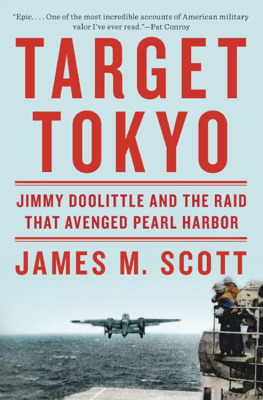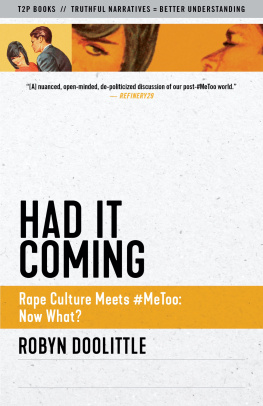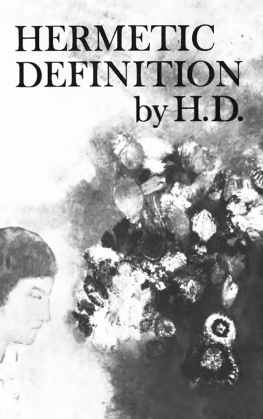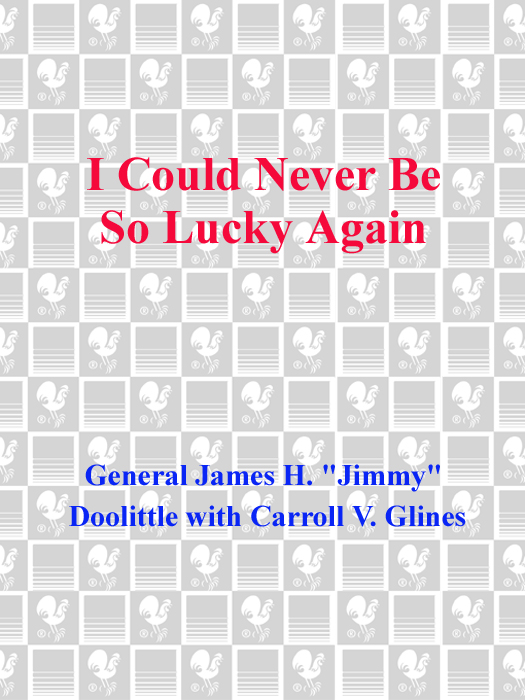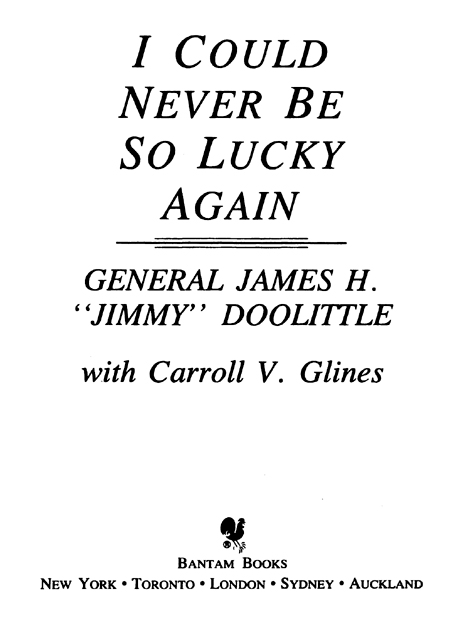PRELUDE TO GLORY
That morning I had an early breakfast with Joe and packed my B-4 bag. I told her, Ill be out of the country for a while. Ill be in touch as soon as I can.
She knew nothing about what I had been doing over the past few weeks at Eglin and McClellan. When I was working in industry I always kept her informed of my itinerary during my many trips. But when I put the uniform on, she always believed that a military mans wife, family, and friends have no right or need to know official secrets. I always appreciated her attitude about that, but know how difficult it is for any wife to accept not knowing where her husband is going or when hell be back.
We had had many separations before in our lives together, but I had the feeling she knew this departure was different. I kissed her tenderly. She held back her tears, but Im sure she thought it was going to be a long time before she saw me again. I wondered if we would ever see each other again.
I COULD NEVER BE SO LUCKY AGAIN
A Bantam Book
PUBLISHING HISTORY
Bantam hardcover edition published September 1991
Bantam paperback edition / August 1992
Grateful acknowledgment is made for permission to reprint the following: Excerpt from THE SPIRIT OF ST. LOUIS by Charles A. Lindbergh reprinted with permission of Charles Scribners Sons, an imprint of Macmillan Publishing Company. Copyright 1953 Charles Scribners Sons; copyright renewed 1981 Anne Morrow Lindbergh. Excerpt from Thirty Seconds Over Tokyo by Ted W. Lawson, copyright 1943, 1953 and renewed 1971 by Ted Lawson and Robert Considine. Reprinted by permission of Random House, Inc. Excerpt from The Tibbets Story, copyright 1978 by Paul W. Tibbets. Originally published by Stein & Day, Inc., reprinted with permission of Scarborough House, Publishers. Excerpt from the Drew Pearson syndicated column reprinted by permission of UFS, Inc.
All rights reserved.
Copyright 1991 by The John P. Doolittle Family Trust.
Library of Congress Catalog Card Number: 91-3353.
No part of this book may be reproduced or transmitted in any form or by any means, electronic or mechanical, including photocopying, recording, or by any information storage and retrieval system, without permission in writing from the publisher.
For information address: Bantam Books.
eISBN: 978-0-307-42832-5
Bantam Books are published by Bantam Books, a division of Random House, Inc. Its trademark, consisting of the words Bantam Books and the portrayal of a rooster, is Registered in U.S. Patent and Trademark Office and in other countries. Marca Registrada. Bantam Books, 1540 Broadway, New York, New York 10036.
v3.1_r1
Contents
F OREWORD
O ne of the valued honors of my life is preparing this foreword for Jimmy Doolittles memoirs. Its an honor because I consider him to be one of the greatest Americans we have had in our history.
Jimmy has been my hero since my teenage years of the 1920s when he thrilled the world with his daring aerobatics and set many speed records. His winning of the Thompson Trophy in the Gee-Bee racer that had earned such a bad reputation especially caught my imagination. Everything he did thereafter seemed to make news and I followed his exploits in the papers and on radio as avidly as other kids followed stories about sports heroes like boxers Gene Tunney and Jack Dempsey and the great baseball players of the day, Ty Cobb and Babe Ruth.
Like many other kids of my generation, Jimmys aerial escapades and fearless racing inspired me to take up flying. I wanted to be a pilot like Jimmy Doolittle and earn my wings in the Army Air Forces. I did, eventually, in a roundabout way. Hes still my hero not only because of his activities as a pilot, but because of the many lasting contributions he has made to flying and to our way of life.
You will find out in these pages from Jimmy himself that he enjoyed raising a bit of hell in an airplane in his early days. He had forced landings and crashes, many of them, but learned something valuable each time. He bailed out three times to save himself. He became a test pilot. And in those days, before aeronautical engineers and high-speed wind tunnels could give us a fair idea of how much an airplane could stand before disintegrating, that meant he found out personally by flying them to near destruction. He was a daredevil as far as his public image was concerned, but few know that he was one of the first, if not the first, to earn a doctorate in the aeronautical sciences. And from MIT, no less. His doctorate provided him with the knowledge that enabled him to help develop high-octane fuel. Without this, our defeat of Germany in the air may not have been possible. He taught us how to get more mileage out of a tank of fuel.
Perhaps most Americans remember Jimmy for leading the surprise raid on Japan of April 18, 1942. No one, especially not the Japanese, thought anyone could fly heavily loaded land-based medium bombers off a carriers deck. Jimmy and his Tokyo Raiders did and taught the Japanese an important lesson: America could and would retaliate for the attack on Pearl Harbor. It was a psychological blow more than a destructive one, but it gave Americans the morale boost we so desperately needed at that time.
Such a daring flight was typical of Jimmy. By that time he had become known as the master of the calculated risk, a hard-earned title that came about because although he took great personal risks he always did so by first thinking through the variables involved and allowing himself better than fifty-fifty odds of survival.
Jimmys greatest contributions to aviation were the 1929 experiments with instrument flying that led to his being the first pilot ever to fly completely blind from takeoff to landing. All of us flying today are the beneficiaries of his skill, foresight, and persistence in seeking the solution to all-weather flying.
Jimmy Doolittle is too modest to say these things, but as you read this book, you will see how this former boxing champion matured as a leader of men and took on successively more difficult jobs during World War II. Along with Generals Hap Arnold, Tooey Spaatz, and Ira Eaker, Jimmy pioneered strategic bombing and laid the groundwork for victory in Europe.
Jimmys extraordinary energy, common sense, and faith in his people made him one of the most revered generals in our history. In North Africa, he chose to fly on the most difficult missions because he wanted to see firsthand what the enemy defenses and fighter tactics were. His dedication and single-minded enthusiasm to get any job assigned to him completed successfully were infectious and earned him increasing responsibilities. His leadership of the famous 8th Air Force is a classic case of superb management of men and their machines to help bring about success in war.
As you will note, Jimmy did not fade away when the war was over. He has probably served on more federal boards and commissions than any other American. His contributions to knowledge and to the progress of aeronautics and astronautics have earned him more awards, honors, citations, plaques, and trophies than anyone else I know of. Yet he has remained modest, unassuming, and amazed that what he has done should continue to gain such enthusiastic accolades.


